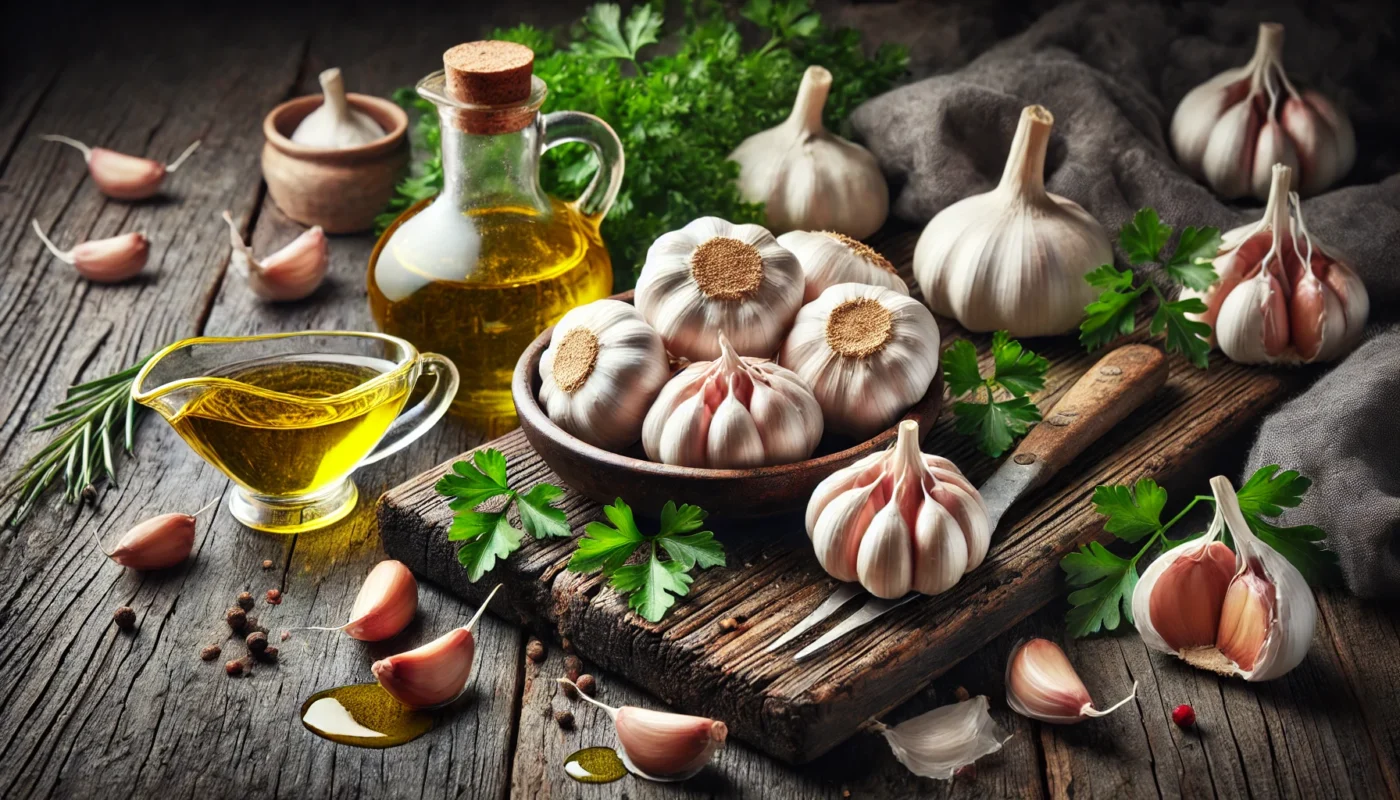Garlic is a common ingredient in many kitchens. It adds flavor to dishes and is known for its health benefits.
But did you know that garlic is also a potent anti-inflammatory agent?
This article will delve into the science behind garlic’s anti-inflammatory properties. We’ll explore how this humble bulb can help reduce inflammation in the body.
Whether you’re a fitness enthusiast, a health enthusiast, or a medical patient, this article is for you. It aims to provide practical advice on how to incorporate garlic into your health and wellness routines.
We’ll debunk myths, such as “is garlic inflammatory?” and “does garlic cause inflammation?” We’ll also answer the question, “is garlic good for inflammation?”
By the end of this article, you’ll have a comprehensive understanding of garlic’s role as an anti-inflammatory agent. You’ll also learn how to effectively use it to improve your wellbeing.
So, let’s embark on this journey to discover the benefits of garlic as an anti-inflammatory agent.
You May Also Like: Do Antioxidants Really Combat Inflammation Effectively?
Understanding Inflammation and Natural Remedies
Inflammation is a natural response of the body’s immune system. It occurs when the body fights against things that harm it, like infections or injuries. However, chronic inflammation can lead to various health issues, including heart disease and arthritis.
Managing inflammation is crucial for overall health. While medications are available, many people turn to natural remedies. These remedies include herbs and foods with anti-inflammatory properties. Such options offer a gentle and holistic approach to reducing inflammation.
Garlic is one of these natural anti-inflammatory remedies. It has been used for centuries to support health. Its ability to reduce inflammation makes it an attractive choice for those seeking natural solutions. Embracing a diet rich in anti-inflammatory foods like garlic can support long-term health and wellness. By incorporating garlic and other natural remedies, individuals can harness the power of nature for healing and prevention.
The Historical Use of Garlic in Medicine
Garlic’s medicinal use dates back thousands of years. Ancient cultures, including Egyptians, Chinese, and Greeks, revered garlic for its health benefits. It was a staple in traditional healing for its purported power to treat infections and improve strength.
In Egypt, garlic was crucial for laborers constructing the pyramids. It was believed to boost endurance and combat fatigue. Similarly, Greeks used garlic for its supposed strength-enhancing properties, giving it to athletes before competitions.
Traditional Chinese medicine also valued garlic. Practitioners used it to address respiratory and digestive ailments. This long-standing history highlights garlic’s enduring role in health and wellness. Its ancient uses underpin the modern exploration of its medicinal properties. By understanding garlic’s historical context, we gain insight into its potential benefits today.

The Science Behind Garlic’s Anti-Inflammatory Properties
Garlic’s anti-inflammatory prowess is primarily attributed to its sulfur compounds. These compounds play a significant role in reducing inflammation in the body. Scientific studies have shown that sulfur compounds, like allicin, are crucial for its medicinal qualities.
When garlic is crushed or chopped, allicin is released. This compound is renowned for its potent biological effects. Allicin interacts with the body’s systems to help reduce inflammation markers.
Research indicates garlic’s potential in reducing chronic inflammation. This type of inflammation can lead to diseases like arthritis, heart disease, and cancer. Thus, garlic is heralded for its preventive health benefits.
The anti-inflammatory effects of garlic extend to supporting cardiovascular health. It helps lower blood pressure and cholesterol levels. This reduces the risk of heart disease, adding to garlic’s health credentials.
Here’s a quick overview of garlic’s anti-inflammatory benefits:
- Sulfur compounds like allicin reduce inflammation.
- Helps manage chronic inflammation-related diseases.
- Supports cardiovascular health by lowering blood pressure and cholesterol.
Garlic not only reduces inflammation but also boosts immune health. This dual action makes it a valuable addition to a balanced diet. By modulating immune responses, garlic helps fend off illness, providing comprehensive health support. Such scientific insights underscore the importance of garlic in managing inflammation naturally.
Allicin: The Key Compound in Garlic
Allicin stands out as the most potent compound in garlic. It emerges when garlic is crushed, chewed, or chopped. This activation process unleashes its remarkable health benefits.
Allicin is known for its powerful anti-inflammatory and antioxidant properties. It helps the body combat harmful free radicals. This action supports the body’s ability to heal and reduce inflammation naturally.
The compound also plays a role in enhancing immunity. By promoting white blood cell activity, allicin can help fight infections. This immune boost is why garlic is a staple in traditional medicine for illnesses. Allicin’s health benefits make garlic a critical tool in natural inflammation management. Understanding this compound’s role can guide incorporating garlic into everyday diets for maximum benefit.
How Garlic Fights Inflammation in the Body
Garlic tackles inflammation through several mechanisms in the body. Its unique compounds work synergistically to combat inflammatory processes. This holistic action makes garlic a versatile anti-inflammatory agent.
Sulfur compounds in garlic are particularly significant. They modulate the production of pro-inflammatory cytokines. By reducing cytokine levels, garlic helps in soothing inflamed tissues.
Garlic’s antioxidants complement this process. They neutralize free radicals that contribute to inflammation. This dual action of reducing free radicals and cytokines fosters a less inflamed state.
Additionally, garlic influences the microbiome within the gut. It promotes beneficial bacteria, supporting overall health and reducing inflammation. A healthy gut microbiome is crucial for managing inflammatory responses effectively.
Through these multifaceted actions, garlic offers comprehensive support against inflammation. By integrating it into your diet, you can naturally manage inflammation and enhance wellness.
Garlic and Cardiovascular Health
Garlic has long been associated with improved cardiovascular health. It plays a vital role in managing heart disease risk factors. This is primarily due to its ability to lower blood pressure.
When consumed regularly, garlic can decrease blood pressure. This happens as garlic helps to relax and widen blood vessels. This relaxation effect reduces the workload on the heart.
Additionally, garlic has a positive impact on cholesterol levels. It can lower LDL (bad) cholesterol, a significant marker in heart disease. By doing so, garlic supports heart health and reduces the risk of cardiovascular conditions.
Garlic’s beneficial effects extend beyond blood pressure and cholesterol. Its anti-inflammatory properties may help prevent atherosclerosis. Atherosclerosis is the buildup of plaques in arteries, a leading cause of heart attacks. Thus, the presence of garlic in one’s diet is a heart-friendly choice.
Garlic’s Role in Immune Function and Common Illnesses
Garlic is a powerful ally for the immune system. It is known for enhancing immune functions, thanks to its rich array of compounds like allicin. These compounds provide antimicrobial and antibacterial benefits, helping to combat various pathogens.
Regular garlic consumption may reduce the frequency and severity of common illnesses such as colds and the flu. Studies suggest that individuals who incorporate garlic into their diet experience fewer colds. Moreover, when they do get sick, their symptoms tend to be less severe.
Garlic’s role in supporting the immune system makes it beneficial for overall health. By helping to fend off common infections, it contributes to reduced downtime and faster recovery. Integrating garlic into one’s diet is a practical approach to bolstering immune defenses and maintaining optimal health year-round.
The Impact of Garlic on Arthritis and Autoimmune Diseases
Garlic may offer relief to those suffering from arthritis and autoimmune diseases. Its anti-inflammatory properties help reduce the inflammation that often exacerbates these conditions. Sulfur compounds in garlic are thought to inhibit pathways that lead to inflammatory responses in the body.
Studies have noted that consuming garlic can alleviate symptoms like joint pain and stiffness. Individuals with rheumatoid arthritis might experience improved mobility and reduced discomfort. The potential of garlic to modulate immune responses can also prevent autoimmunity from escalating.
Incorporating garlic into the diet could be a natural strategy to manage these chronic conditions. While it cannot replace medical treatments, garlic’s benefits can complement them. Its use as a dietary supplement or food ingredient offers a holistic approach to reducing inflammation and managing pain associated with arthritis and autoimmune disorders.

Garlic and Brain Health: Preventing Neurodegenerative Diseases
Garlic’s potential benefits extend to brain health, offering hope in preventing neurodegenerative diseases. Its antioxidants combat oxidative stress, a key factor in conditions like Alzheimer’s. These properties help protect neurons from damage over time.
Consuming garlic might improve cognitive functions by enhancing blood flow to the brain. Improved circulation ensures a consistent supply of nutrients and oxygen, necessary for brain vitality. It may also support synaptic plasticity, crucial for learning and memory.
Research indicates that garlic can reduce inflammation in neural tissues, lowering the risk of neurodegenerative changes. Regularly including garlic in one’s diet could thus serve as a protective measure. While more studies are needed, garlic remains a promising natural ally in maintaining brain health and potentially delaying the onset of related diseases.
Practical Ways to Incorporate Garlic into Your Diet
Integrating garlic into your daily diet can be both easy and delicious. It’s versatile and can enhance the flavor profile of many dishes. A simple way is to add minced garlic to soups or stews as they simmer, releasing a rich aroma.
Experiment with using raw garlic in salad dressings or marinades. Crushing raw garlic releases allicin, maximizing its health benefits. For a savory twist, combine it with olive oil and lemon juice for a tangy salad dressing.
Garlic can also be a staple in sauces and spreads. Roasting garlic makes it sweeter and milder, perfect for spreading on bread. Use roasted garlic in dips such as hummus or mashed into butter for a flavorful spread.
For a more structured approach, here’s a list of ways to incorporate garlic:
- Add minced garlic to soups and stews.
- Use raw garlic in dressings and marinades.
- Roast garlic as a side dish.
- Incorporate roasted garlic into dips.
- Sauté garlic with vegetables or meats.
Incorporating garlic into your diet can be both enjoyable and healthful. These easy methods let you harness its anti-inflammatory properties daily. Whether you prefer it raw or cooked, garlic can enhance both your meals and your well-being.
Garlic Supplements: Benefits and Considerations
Garlic supplements are an excellent option for those who may not enjoy the taste of garlic or want a consistent dosage. They come in various forms, such as tablets, capsules, and aged garlic extracts. These supplements provide concentrated doses of garlic’s active compounds, including allicin, which is responsible for many health benefits.
However, it’s crucial to choose supplements wisely to ensure maximum efficacy. Some products may lack sufficient levels of allicin due to processing methods. Look for supplements standardized to allicin content for better results. Always check labels for quality certifications and reviews to verify their credibility.
It’s important to consider the potential interactions between garlic supplements and medications. Garlic supplements can affect blood clotting, so they may not be suitable for those on blood-thinning drugs. Consulting with a healthcare professional before starting garlic supplements is advisable, especially if you have existing health conditions or take other medications.
Potential Side Effects and Interactions with Medications
While garlic offers numerous health benefits, it’s important to be aware of potential side effects. Some individuals may experience digestive issues, such as heartburn or bloating, when consuming garlic in large amounts. Eating garlic in moderation can help mitigate these effects.
Another consideration is garlic’s impact on blood thinning. Garlic has natural anticoagulant properties, which can be beneficial for heart health but problematic for individuals on blood-thinning medications. These properties might increase the risk of bleeding, particularly during surgical procedures.
Additionally, some people may be allergic to garlic, experiencing symptoms like skin irritation or breathing difficulties. If you suspect a garlic allergy, it’s best to consult a healthcare provider. Always discuss any potential interactions with your doctor, especially if you’re taking medications or managing existing health conditions. Balancing garlic intake with medical guidance ensures you can safely enjoy its anti-inflammatory benefits.
Debunking Myths: Does Garlic Cause Inflammation?
There is a common misconception that garlic may cause inflammation. This myth likely stems from misunderstanding its potent nature. In reality, garlic is celebrated for its anti-inflammatory properties rather than causing inflammation.
The confusion might arise when people experience gastrointestinal discomfort after consuming garlic. Such responses are more related to individual sensitivities. For most, garlic actually helps reduce inflammation, supported by its sulfur compounds.
Scientific research has repeatedly demonstrated garlic’s ability to decrease inflammation markers in the body. These properties make it an ally in managing inflammatory conditions. It’s crucial to distinguish between temporary discomfort from overconsumption and garlic’s long-term health benefits. Understanding these nuances helps in making informed dietary choices.
Frequently Asked Questions About Garlic and Inflammation
Garlic’s role as an anti-inflammatory agent often leads to numerous questions. Here, we’ll address some of the most common inquiries.
Is Garlic an Inflammatory Food?
Simply put, garlic is not an inflammatory food. It contains compounds that actively reduce inflammation. Allicin, a sulfur compound, is primarily responsible for its powerful anti-inflammatory effects.
Can Garlic Cause Inflammation in Some People?
In rare cases, garlic may cause digestive discomfort, but this is not true inflammation. Such issues could be due to individual sensitivities or allergies. It’s important to monitor your body’s reaction to garlic.
How Much Garlic Should I Consume for Health Benefits?
The World Health Organization suggests a daily intake of 2 to 5 grams of fresh garlic for health advantages. This could be integrated into meals or taken as a supplement.
Does Cooking Garlic Affect Its Anti-Inflammatory Properties?
Cooking can reduce certain beneficial compounds in garlic, but it still retains its anti-inflammatory properties. Crushing or chopping garlic and letting it sit before cooking can help preserve its health benefits. To ensure you’re reaping the maximum benefits, consider incorporating both raw and cooked garlic into your diet.

Conclusion: Embracing Garlic for Holistic Health
Garlic stands out as a natural remedy with potent anti-inflammatory benefits. It offers a simple, effective way to enhance overall health. By reducing inflammation, garlic supports vital body processes and helps prevent chronic diseases.
Incorporating garlic into your diet can be both easy and versatile. Whether consumed raw, cooked, or in supplement form, it retains its health-promoting properties. Garlic pairs well with numerous dishes, making it a flavorful addition to meals.
It is crucial to recognize garlic’s role in a balanced lifestyle. While it offers substantial benefits, it’s essential to consume it alongside other healthy habits. Embracing garlic as part of a holistic approach can empower you to take charge of your well-being.
Further Reading:
Cleveland Clinic: The Health Benefits of Garlic
National Library of Medicine: Potential Health Benefit of Garlic Based on Human Intervention Studies: A Brief Overview
Garlic, health benefits, anti-inflammatory, garlic supplements, cooking with garlic, digestive health, natural remedies, nutrition, dietary tips, garlic myths, inflammation, wellness, holistic health, food and health, garlic recipes
Important Note: The information contained in this article is for general informational purposes only, and should not be construed as health or medical advice, nor is it intended to diagnose, prevent, treat, or cure any disease or health condition. Before embarking on any diet, fitness regimen, or program of nutritional supplementation, it is advisable to consult your healthcare professional in order to determine its safety and probable efficacy in terms of your individual state of health.
Regarding Nutritional Supplements Or Other Non-Prescription Health Products: If any nutritional supplements or other non-prescription health products are mentioned in the foregoing article, any claims or statements made about them have not been evaluated by the U.S. Food and Drug Administration, and such nutritional supplements or other health products are not intended to diagnose, treat, cure, or prevent any disease.

